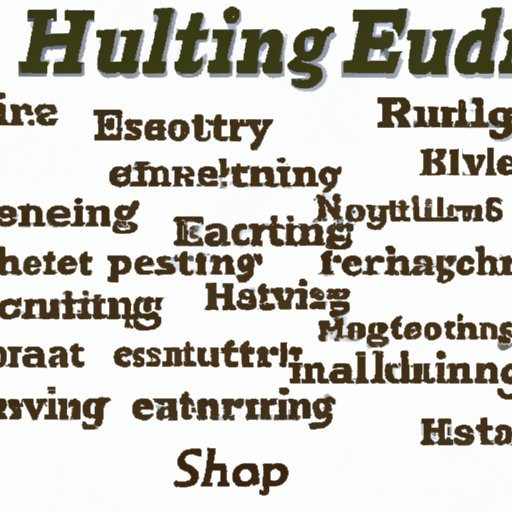Introduction
Hunting is an activity that has been practiced since ancient times, and is still popular today. It involves the pursuit and killing of wild animals for food, sport, or other purposes. This article provides a comprehensive overview of what hunting is, its history, different types and techniques, benefits and risks, as well as the legalities and regulations surrounding the sport. Additionally, it examines the ethical debate surrounding hunting, and its role in conservation.
A History of Hunting
The practice of hunting dates back to prehistoric times, when humans first began to hunt animals for food. Over time, the activity evolved and became more complex, with hunters using various tools and techniques to pursue their prey. During the Middle Ages, hunting was primarily done for sustenance, but it eventually developed into a form of recreation and sport.
In the modern era, hunting has become increasingly popular, with many people now taking part in the activity for recreational purposes. Hunting practices have changed over time, with some hunters now focusing on conservation and sustainability, while others focus on the challenge of pursuing their prey. In addition, new technologies and tools have been developed to make hunting easier and more efficient.

An Overview of Hunting Types and Techniques
There are several different types of hunting, including big game hunting, small game hunting, bird hunting, and trapping. Big game hunting involves the pursuit and killing of large animals such as deer, elk, and bear. Small game hunting includes the pursuit of smaller animals such as squirrels, rabbits, and raccoons. Bird hunting involves the use of specialized firearms and equipment to hunt waterfowl and upland birds. Trapping is the practice of capturing animals in cages or traps, typically for fur or meat.
Common hunting tools and gear include firearms, archery equipment, ammunition, decoys, camouflage clothing, and scent eliminators. These items can be purchased at hunting stores or online retailers. Hunters must also obtain the necessary permits and licenses to hunt in their area.
Understanding the Benefits and Risks Associated with Hunting
Hunting can provide a number of economic benefits, such as providing a source of income for hunters, creating jobs in the outdoor recreation industry, and generating tax revenue for local governments. Hunting can also provide food for individuals and families, as well as contribute to wildlife conservation efforts.
However, there are also potential health and safety risks associated with hunting, such as injury or death due to firearms accidents. Hunters must take the necessary precautions to ensure their safety while out in the field.

Examining the Legalities and Regulations of Hunting
Laws governing hunting practices vary from state to state, and hunters must adhere to the regulations in their area. In general, hunting laws cover topics such as the types of animals that can be hunted, the type of weapons and equipment that can be used, the seasons during which hunting is allowed, and the amount of game that can be taken. Local, state, and federal regulations should be consulted before heading out on a hunting trip.

Investigating the Ethical Debate Surrounding Hunting
The ethical debate surrounding hunting is complex, and opinions on the subject vary widely. Animal welfare advocates argue that hunting is cruel and unnecessary, while supporters of the sport claim that it is a vital part of conservation efforts and provides important economic benefits. Ultimately, each person must decide for themselves if they believe hunting is ethical or not.
Exploring the Role of Hunting in Conservation
Hunting has long been seen as a tool for managing wildlife populations, and it has played an important role in conservation efforts. Hunters help to control animal populations by harvesting surplus animals, reducing competition for resources, and promoting genetic diversity. Hunting can also provide funding for conservation initiatives and habitat restoration projects.
Conclusion
In conclusion, hunting is an activity that has been practiced for centuries and continues to be popular today. It involves the pursuit and killing of wild animals for food, sport, or other purposes. This article provided an overview of the history of hunting, different types and techniques, benefits and risks, legalities and regulations, ethical debate, and its role in conservation.
Ultimately, whether hunting is ethical or not is a personal decision that each individual must make for themselves. However, it is important to understand the potential benefits and risks associated with the activity, as well as the laws and regulations that govern it. As long as hunters abide by the rules and regulations, hunting can be a safe and enjoyable experience.


